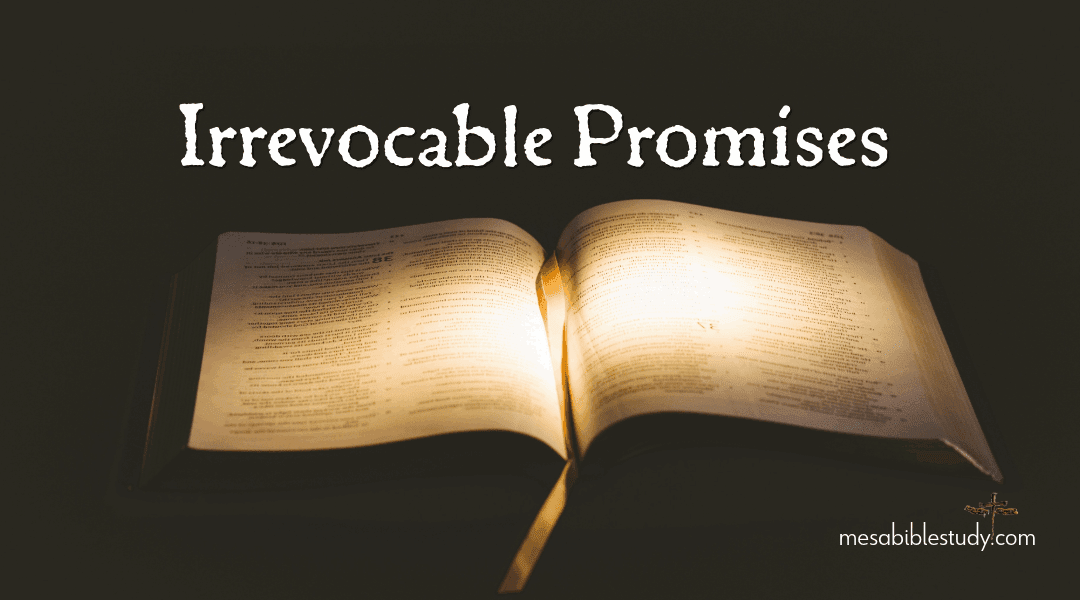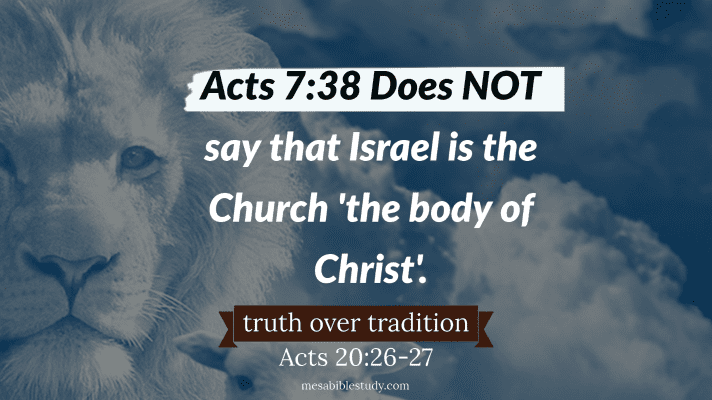
by Jamie Pantastico | Jul 15, 2025 | Daily Encouragement, Israel |
A verse misused to promote antisemitism and replacement theology
⚠️ Revelation 2:9 has been misused to promote antisemitism and replacement theology, but Jesus never revoked God’s promises to Israel. The apostle Paul warned the church that savage wolves would arise from within, not sparing the flock and seeking to destroy it. Starting with the so-called church fathers and continuing with countless others, these men eagerly twisted Scripture, distorting God’s truth to glorify themselves.
‘For I know this, that after my departure savage wolves will come in among you, not sparing the flock. Also from among yourselves men will rise up, speaking perverse things, to draw away the disciples after themselves. Therefore watch, and remember that for three years I did not cease to warn everyone night and day with tears.’
Acts 20:29-31
📜 Background & Context
✍️ Author: The Apostle John, exiled on the island of Patmos.
👥 Written To: The church in Smyrna, one of the seven churches in Asia Minor.
📅 When: Around AD 95, during the reign of Emperor Domitian.
📚 Purpose / Setting of the Verse:
Revelation 2:9 is part of Jesus’ message to the believers in Smyrna—a church facing persecution, poverty, and slander. Jesus comforts them with the truth that He sees and knows their suffering. However, the verse includes a strong rebuke aimed at a specific group opposing the gospel—a line that has been ripped from its context by those promoting replacement theology and antisemitism.
🔍 Revelation 2:9
“I know your works, tribulation, and poverty (but you are rich); and I know the blasphemy of those who say they are Jews and are not, but are a synagogue of Satan.”
✨ Phrase-by-Phrase Breakdown
“I know your works, tribulation, and poverty (but you are rich);”
- Jesus affirms their faithfulness, even amid suffering.
- Though poor in material goods, they are rich in faith (cf. James 2:5).
- He sees their struggle and honors their steadfastness.
“I know the blasphemy…”
- “Blasphemy” here means slander or false accusation.
- The believers were being maligned, possibly accused of crimes against Rome or Judaism.
- Jesus calls this out as false and unjust.
“…of those who say they are Jews and are not…”
- This refers to a specific group of Jews in Smyrna opposing the gospel—not to Jews as a people.
- They were ethnically Jewish, but by opposing God’s Messiah, they were acting contrary to their true spiritual identity.
- Paul uses similar language in Romans 2:28–29, describing a “true Jew” as one inwardly, whose heart is right before God.
📖 This is not a statement that Jews are no longer God’s people—rather, it highlights that spiritual identity is rooted in faith, not just heritage.
“…but are a synagogue of Satan.”
- This phrase addresses the spiritual nature of their opposition.
- These individuals—though religious—were being used by Satan to hinder the work of Christ.
- It is not a condemnation of synagogues or of Judaism as a whole.
- Jesus is making a spiritual diagnosis: opposition to the gospel, even in religious form, aligns with the enemy’s work.
📖 Compare with John 8:44 where Jesus rebukes unbelieving leaders who sought to kill Him—not for being Jewish, but for rejecting truth and following lies.
❌ What This Verse Does Not Mean
- It does not teach that all Jews are no longer God’s chosen people.
- It does not endorse or excuse antisemitism.
- It does not support the idea that the Church has replaced Israel.
✅ What It Does Mean
- This is a word of comfort to persecuted believers.
- Jesus is exposing a specific group of persecutors who were opposing the gospel in Smyrna.
- Their actions were being used by the enemy—thus, they are described as a “synagogue of Satan.”
- This verse affirms the reality of spiritual warfare, even when it comes cloaked in religious clothing.
✨ Summary
Revelation 2:9 has often been misused to justify hatred against Israel and to prop up the false doctrine of replacement theology. But when we look closely, it is clear:
Jesus is not denouncing the Jewish people—He is comforting His Church and rebuking a small group of individuals actively opposing the truth.
God’s plan for Israel remains intact. His promises are irrevocable (Romans 11:29).
Those who twist this verse to support antisemitism are not defending truth—they are distorting it.
🕊️ Truth matters. So does context. Scripture must interpret Scripture—never our bias.

by Jamie Pantastico | Jul 15, 2025 | Daily Encouragement, Israel |
A verse used (and misused) to support replacement theology
📜 Background & Context
✍️ Author: Matthew, the former tax collector and apostle of Jesus Christ.
👥 Written To: Primarily a Jewish audience, to present Jesus as the promised Messiah and King.
When: Likely between AD 50–60.
📚 Purpose / Setting of the Verse:
Matthew 21 takes place during the final week of Jesus’ earthly ministry, just days before His crucifixion. In this chapter, Jesus enters Jerusalem, cleanses the temple, and is confronted by the religious leaders. He responds with three parables of judgment: the two sons, the wicked tenants, and the wedding feast.
Matthew 21:43 is the conclusion of the Parable of the Wicked Tenants (vv. 33–46)—a story about a landowner (God), a vineyard (Israel), tenant farmers (Israel’s leaders), and the landowner’s son (Jesus). The parable is a prophetic indictment against Israel’s leadership, not the nation as a whole.
🔍 Matthew 21:43
“Therefore I say to you, the kingdom of God will be taken from you and given to a nation bearing the fruits of it.”
✨ Phrase-by-Phrase Breakdown
“Therefore I say to you…”
- Jesus is speaking directly to the chief priests and Pharisees (v. 45).
- This follows their challenge to His authority (v. 23) and His parable exposing their guilt (vv. 33–41).
- “You” = Israel’s religious leaders, not the entire nation.
…the kingdom of God will be taken from you…
- The opportunity and stewardship of God’s kingdom was being removed from these leaders.
- It was not Israel’s promises or covenants being revoked—but this generation’s role in representing God was being suspended due to their rejection of the Messiah.
📖 See Luke 19:44 — “…because you did not know the time of your visitation.”
…and given to a nation…
- The Greek word ἔθνει (ethnei) is singular—a people group, not “nations” (plural).
- Jesus is referring to a new spiritual body of believers, made up of both Jew and Gentile, who respond in faith and bear fruit.
- This is the Body of Christ, revealed later through Paul—not a Gentile-only nation, and not a replacement of Israel.
⚠️ Important Clarification:
1 Peter 2:9 is often used by replacement theologians to support this idea. But 1 Peter was written to scattered (because of the persecution surrounding Stephen) believing Jews (1 Peter 1:1) from the Jerusalem church—those who believed Jesus was the Christ, the Son of God, according to the gospel of the kingdom. This is not a reference to the Church replacing Israel.
…bearing the fruits of it.
- Fruitfulness is the mark of stewardship.
- The true people of God during this present age are those who believe the gospel of grace and are indwelt by the Spirit.
- But this is not a permanent removal—Israel’s role will be restored in the future (Romans 11:25–27).
❌ What This Verse Does Not Mean
- It does not mean that the Church has replaced Israel.
- It does not cancel the unconditional covenants God made with Abraham, David, or the prophets.
- It does not teach that Israel has no future in God’s redemptive plan.
✅ What It Does Mean
- This is a prophetic judgment against the leaders of Israel who rejected their Messiah.
- God is temporarily giving the responsibility of kingdom witness to a new group: the Body of Christ—those who believe the gospel of grace revealed to Paul.
- Israel is not replaced. Their national restoration is still to come, and God’s covenants remain in effect.
✨ Summary
Matthew 21:43 is a verse often misused to support replacement theology, but a closer look reveals it to be a rebuke—not of Israel as a nation—but of that generation’s leadership for rejecting their Messiah.
God’s promises to Israel are irrevocable (Romans 11:29). Though Israel was temporarily set aside, God is not finished with them. The “nation” now bearing kingdom fruit is not a replacement, but a pause in the prophetic timeline—a mystery revealed to Paul.
God is faithful. His covenants still stand. And His plan will unfold exactly as He declared.

by Jamie Pantastico | Jun 1, 2025 | Israel |
Unbreakable: God’s Promises to Israel and the Coming Kingdom
For your encouragement and edification
‘“God is not a man, that He should lie, Nor a son of man, that He should repent. Has He said, and will He not do? Or has He spoken, and will He not make it good?’
Numbers 23:19
God’s Covenants Are Unbreakable
At the heart of God’s relationship with Israel is the word “covenant.” It is one of the most powerful and binding terms in all of Scripture. A covenant is a divinely initiated agreement between God and man, in which God makes promises that are often accompanied by specific obligations. These are not mere contracts—they are sacred, binding commitments rooted in the character and faithfulness of God.
The Lord made six covenants with the nation of Israel:
- The Abrahamic Covenant – the foundational promise of a nation, land, and blessing to all nations (Genesis 12, 15, 17).
- The Mosaic Covenant – the giving of the Law at Sinai, conditional on obedience (Exodus 19–24).
- The Sabbatic Covenant – God’s promise of rest and blessing through observance of the Sabbath cycle, both weekly and in the land (Exodus 31:12–17; Leviticus 25–26).
- The Palestinian (Land) Covenant – a reaffirmation of the land promise, with blessings for obedience and consequences for disobedience, but ultimate restoration guaranteed (Deuteronomy 29–30).
- The Davidic Covenant – the eternal promise of a king from David’s line to rule over Israel (2 Samuel 7).
- The New Covenant – a promise of spiritual renewal, forgiveness, and God’s Spirit written on the hearts of Israel (Jeremiah 31:31–37; Ezekiel 36).
Why This Matters
For centuries, many have claimed that the Church has replaced Israel, and that these promises were either conditional or forfeited. But Scripture tells a different story. God is not finished with Israel. His covenants—some conditional, others unconditional—are irrevocable (Romans 11:29). What He began with Abraham, He will fulfill through Christ.
This series will walk through each of these six covenants, showing from Scripture how they unfold, where they stand today, and how they point to the future literal Kingdom of God on earth. We will also examine how the prophets, Jesus, Paul, and the book of Revelation all confirm that God’s promises to Israel remain intact—and unfulfilled in their fullness—awaiting a future glorious fulfillment.

by Jamie Pantastico | Mar 7, 2024 | Daily Encouragement, Israel |
In a world filled unprecedented hatred for the Jewish people and the nation of Israel, there stands an unwavering truth: the God of Abraham, Isaac, and Jacob is not finished with His chosen people. The book of Jeremiah verses 32:37-43 declare that Israel, despite its present state of unbelief, remains the “apple of His eye” and an integral part of God’s eternal plan.
The world, and most of Christendom for that matter, may turn their backs on Israel (or not even recognize Israel and God’s chosen people “replacement theology”), but let this serve as a clear warning: those who oppose God’s covenant people tread on perilous ground. The promise of Genesis 12:3 holds true today—those who bless Israel will be blessed, and those who curse Israel will find themselves in the annals of forgotten history.
In Psalm 89:24-37, the unbreakable covenant with David echoes through the ages, proclaiming that God’s promises are not contingent on the present circumstances of His people. Even when Israel falters in unbelief, the Almighty remains steadfast in His commitment.
To the world chanting slogans of upheaval, like “from the river to the sea, Palestine will be free” beware: the force (Jesus Christ) that holds the universe in its hands stands guard over His chosen people. No cry for the demise of Israel, no matter how loud, can alter the course set by the Creator of all things. The warning is clear—those who defy the divine order and seek the downfall of God’s chosen people, the Jewish people, risk being crushed by a force mightier than any in the universe.
Let Psalm 89:24-37 and Jeremiah 32:37-43 serve as a resolute reminder: God’s promises endure, and the destiny of His chosen people, the Jews, remains under the sovereign protection of the Almighty.
Scripture References:
Jeremiah 32:37-43
Genesis 12:3
Psalm 89:24-37
Jeremiah 32:37-43
“Behold, I will gather them out of all countries where I have driven them in My anger, in My fury, and in great wrath; I will bring them back to this place, and I will cause them to dwell safely. They shall be My people, and I will be their God; then I will give them one heart and one way, that they may fear Me forever, for the good of them and their children after them. And I will make an everlasting covenant with them, that I will not turn away from doing them good; but I will put My fear in their hearts so that they will not depart from Me. Yes, I will rejoice over them to do them good, and I will assuredly plant them in this land, with all My heart and with all My soul.”
Genesis 12:3
“I will bless those who bless you, and I will curse him who curses you; and in you, all the families of the earth shall be blessed.”
Psalm 89:24-37
“But My faithfulness and My mercy shall be with him, and in My name, his horn shall be exalted. Also, I will set his hand over the sea, and his right hand over the rivers. He shall cry to Me, ‘You are my Father, my God, and the rock of my salvation.’ Also, I will make him My firstborn, the highest of the kings of the earth. My mercy, I will keep for him forever, and My covenant shall stand firm with him. His seed also, I will make to endure forever, and his throne as the days of heaven.”

by Jamie Pantastico | Jun 12, 2021 | Israel |
Lifting one verse from the New Testament (Acts 7:38) to make doctrine is foolishness
We must use the full counsel of God to discern Scripture, no matter if it’s just one passage or an entire chapter. Just making the statement “Israel was the Church in the Wilderness’ over and over again and lifting ONE or two passages in support is erroneous.
Those who choose to lift one or two passages to build a doctrine are easily exposed as false teachers against the full counsel of God.
And at the core of this type of made-up false teaching is unbelief. They can’t believe what God said so they make it up in their minds.
Ironically, Acts chapter 7 makes it crystal clear that God is dealing NOT with the Gentile world but ONLY with the Jewish people, the nation of Israel. His chosen people. Using Acts 7:38 to support the false teaching the “Israel was the Church in the wilderness” falls apart when one takes 2 or 3 minutes that it takes to read chapter 7 in its entirety.
Coming to any other conclusion after reading Acts chapter 7 other than “Stephen is making his appeal to the Jewish leadership and the nation as a whole (Not the Gentile leaders. The promises of a Messiah, Land and a glorious kingdom meant nothing to ALL the Gentile world). That all the Old Testament promises (Israel’s promised King, land, and the kingdom) were now being fulfilled right before their very eyes. Is the Scriptural definition of twisting Scripture.
The bottom line is that in order to come to the conclusion that “Israel was the Church in the wilderness” after reading Acts chapter 7. And comparing Scripture with Scripture using the whole counsel of God. YOU HAVE TO LIE.
This is the one who was in the congregation (ekklēsia) (That called-out assembly of Jews coming out of Egypt and down to the wilderness of Sinai. This is He who was in the assembly in the wilderness.) in the wilderness together with the angel who was speaking to him on Mount Sinai, and who was with our fathers; and he received living oracles to pass on to you.
Acts 7:38
Acts 7:38 Does Not Say that “Israel was the Body of Christ, which is His Church in the Wilderness” that’s Just Stupid

by Jamie Pantastico | Aug 31, 2020 | Bible Prophecy, Israel |
The Russian Army is Already Operating in Syria and Has Taken Over the Golan Heights along the Syrian and Israeli Border
Most of America and the world have shifted their focus on China. Rightly so, because they have been so overtly aggressive militarily, geopolitically, and of course it because of China we have the coronavirus.
Scripture clearly teaches that shortly after Israel signs a treaty that ensures their safety they will be attacked by Russia but they will not be alone in this invasion. Read on.
According to I 24 News, Russia has taken over the Golan Heights in Syria to Israel’s “North”. North being the operative word here.
It’s interesting to note that the makeup of this Russian force is a mixture of Muslim and Russian soldiers. Dubbed the “Huran Army” the Biblical name of the region this Russian army is led by multiple Muslim officers. As Ezekiel 38:4,6, clearly delineates Russia’s Muslim allies.
Ezekiel 38:14 refers to an attack on Israel by a people from the North parts and Moscow is due North of Jerusalem.
‘“Therefore, son of man, prophesy and say to Gog, ‘Thus says the Lord God : “On that day when My people Israel dwell safely, will you not know it? Then you will come from your place out of the far north, you and many peoples with you, all of them riding on horses, a great company and a mighty army. ‘
Ezekiel 38:14-15

The Red army won’t be invading Israel alone. Ezekiel 38:4-6 4, is clear that many countries of the middle east will be allied with Russia. I believe this invasion will occur soon after the antichrist signs the peace treaty with Israel. The nation of Israel will be caught off guard because they would have lowered their defenses significantly. Knowing this Russia will attack Israel as Ezekial 38:14 clear declares…”when My people (Israel) dwell safely, shalt thou not know it?”
Where’s America?
The United States of America is not mentioned in Bible Prophecy. The countries directly involved in end-time events are clearly defined in Scripture. Many have tried to twist Scripture forcing America into end-time events. But it can not be, because the remaining seven years are Jacob’s trouble, not America’s. All the world will come under God’s wrath but His focus will primarily be on His chosen people, Israel.
I give two possible scenarios
First, when Russia is ready to attack Israel they will simultaneously attack America. There will be tremendous turmoil and unprecedented chaos in America to the point where our military will be needed to stop the violence. As a result, America will be weakened and Russia along with other countries will attack America. But America will still have the wherewithal to retaliate with nuclear arms and completely level Moscow.
Second, because of America’s downward spiral morally, coronavirus, political upheaval, riots, protest, murders, and the irrational hatred persecution of the Church economic collapse will follow for sure and utter chaos and turmoil will America to the brink of collapse. In this weakened state, America will be incapable of preventing the Russian invasion into Israel but will as a last-ditch effort launch a nuclear attack on Moscow.
In either scenario, it would fulfill Ezekiel 39:6 which says, “I will send a fire on Magog (Russia) and among them that dwell carelessly (the unbelievers).
It’s crucial to know that, Revelation 6:8 tells us that 1/4 of the world’s population will die by the end of the first half of the seven-year tribulation. Although many will die as a result of this nuclear war between Russian and America many more will die from the aftermath. With most of the food production wiped out as a result of this nuclear war, in comes the pale horse which is pestilence and famine.
We Won’t Be Here
As we witness first hand the downward spiral morally of America and the world we must come to grips with why such horrible judgment is coming – but we don’t have to worry about facing the “wrath” of God that will be poured out on mankind during the 7 years of tribulation.
Why?
The apostle Paul teaches that before the Antichrist appears, all grace age believers, the body of Christ, His Church, be caught up to meet the Lord in the air (1 Thessalonians 4:13-18). But for those left behind, I Thessalonians 5:1-3. says it all. “Sudden destruction cometh upon them…and they shall not escape.”
Discern the times beloved, because our redemption draws near.






